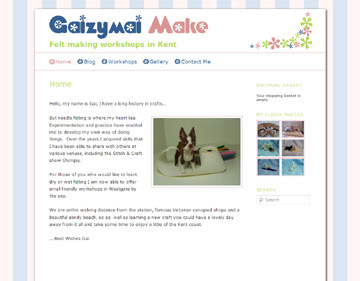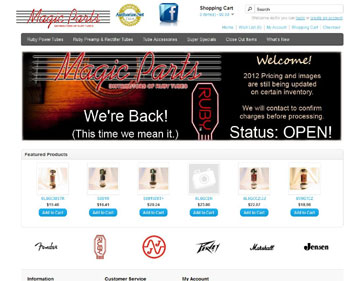Content Management
Content Management Systems (CMS) allow users to add words, pictures and other documents to a website without the need for any technical knowledge. In short, it allows you to keep your own website up to date once it's built, without having to go through us. This is likely to be the best arrangement for most customers (although we also update a few customers' sites for them). All the updating is done online, so you can update your site from anywhere, and you won't need to load any software onto your computer.
There are numerous different CMS systems available, a good number of which are free. We tend to concentrate on two systems, Opencart for online shops, and Wordpress for pretty much anything else.
Wordpress
Wordpress is a free CMS, used by millions of sites worldwide.
We think Wordpress is the easiest to use, full stop. If you can use Microsoft Word, then you can use Wordpress. Updates to the site are managed via a secure online 'Admin Area'. You can see a screenshot below. We think it's pretty intuitive (and one of our clients recently described using Wordpress as 'giant fun') - but don't worry, if we build you a site using Wordpress we'll show you exactly how to use it.

We also like Wordpress because it's very flexible - so if you need something a little extra for your site, like perhaps a restaurant menu manager, then it's easy to add on via ready made 'plugins'. Beyond that, it's also easy to add custom code purpose built for your site.
We've built Wordpress sites that include blogs, lists of printing equipment, discussion forums, conference registration, workshop bookings and quite complex Ordnance Survey mapping integration (and we're particularly proud of that last one!). All the screenshots below are from our Wordpress sites - as you can see you can have them looking pretty much how you want.





Opencart
Opencart is a free online shop/eCommerce platform.
We use it ourself (here), and we picked it because we liked the customer experience. Since then we've added a whole lot of additional bells and whistles as our business has developed, and we're still happy with it.
It is possible to use Wordpress to run an online shop, but if your site is primarily about selling, then Opencart is much the better option, as it provides much greater flexibility to manage (for example) payments, taxes, delivery and customer data. It also handles multiple options and large volumes of products much better. Updates are managed via an online admin area, rather like Wordpress:

We've developed a number of Opencart sites from scratch, and built a number of bespoke additions to existing sites. Here are just a few:




